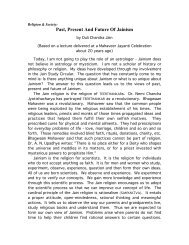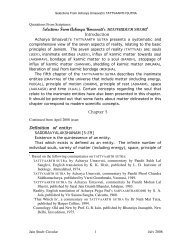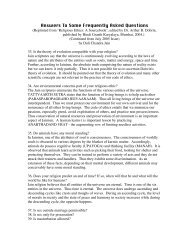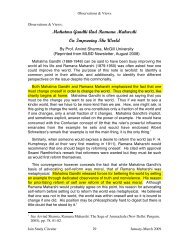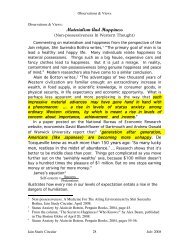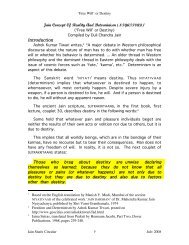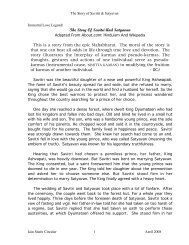Seven Addictions (SAPTA VYASAN)1 - The Jain Study Circle
Seven Addictions (SAPTA VYASAN)1 - The Jain Study Circle
Seven Addictions (SAPTA VYASAN)1 - The Jain Study Circle
Create successful ePaper yourself
Turn your PDF publications into a flip-book with our unique Google optimized e-Paper software.
<strong>Seven</strong> <strong>Addictions</strong><br />
<strong>Seven</strong> <strong>Addictions</strong> (<strong>SAPTA</strong> <strong>VYASAN</strong>) 1<br />
By Kshullak Sanmatisagar<br />
In general, renouncing/eschewing addictions is a prerequisite to the<br />
practice of any religion. This is especially true in the case of <strong>Jain</strong>ism,<br />
because addictions prevent an individual from understanding reality as<br />
<strong>Jain</strong>ism teaches that rational perception and rational knowledge of the<br />
aspects of reality coupled with rational conduct is essential for achieving<br />
contentment and peace in life, the fruits of religious pursuit.<br />
What are addictions?<br />
In a nutshell, addictions comprise immoral and objectionable<br />
tendencies and actions. In NEETIVAAKYAAMRIT, Acharya Somadev defines<br />
addiction as deportment that defiles the character of an individual and<br />
leads him/her away from the path of well-being. Indeed, addictions are<br />
immoral deeds in which an individual indulges on account of sensual<br />
yearning and habits. An individual, who suffers from any kind of<br />
addiction, loses sight of religion, humanity, scholarship, prestige and<br />
truth.<br />
Perceptive scholarly monks have emphasized avoiding addictions along<br />
with adopting immaculate rational perception, free from various<br />
blemishes and reinforced with eight features (ANGAs). 2 Even those who<br />
are not inclined to practice any virtues (VRAT) are advised to stay away<br />
from addictions because an addict indulges in undesirable conduct and<br />
deviates from his goal. But renunciation of addictions is imperative for<br />
individuals who are interested in practicing virtues such as nonviolence,<br />
truth and non-possessiveness. Without renouncing addictions, one<br />
cannot eschew sensual gratification and material pursuit.<br />
Kinds of addictions:<br />
It is not possible to provide a list of addictions, because an addiction is<br />
any activity that impairs the peace and happiness in life, damages the<br />
physical and mental health of the individual, and vitiates his/her status in<br />
society. <strong>Addictions</strong> thrive and aggravate involuntarily, even without<br />
external means of sustenance. <strong>Addictions</strong> constitute an obscure blemish<br />
1<br />
Based on NAVANEET, Part 1, a series of lectures delivered at Shri Syaadvaad<br />
Shikshan Shivir (educational camp) by Kshullak Sanmatisagar, compiled by Jinendra<br />
Kumar, in 1980 at Sonagir, UP, India.<br />
2 For details, please see Studies In <strong>Jain</strong>ism: Reader 2, pages 67-69.<br />
<strong>Jain</strong> <strong>Study</strong> Circular 25<br />
January-March 2009
<strong>Seven</strong> <strong>Addictions</strong><br />
on culture, religion and community. Thus it is rather difficult to establish<br />
the kinds or number of addictions. Indeed there are a large number of<br />
addictions. Nevertheless, for the sake of illustration, seven common<br />
addictions have been described in the <strong>Jain</strong> religious literature. <strong>The</strong>se are<br />
gambling, consuming non-vegetarian foods, alcohol consumption,<br />
prostitution, hunting, stealing and adultery. Each of these addictions<br />
includes other addictions, which also involve similar undesirable mental<br />
and physical activities. For example, consumption of alcoholic beverages<br />
may include use of illicit drugs and other intoxicating substances.<br />
Gambling:<br />
Gambling impedes intellect by clouding the ability to think rationally.<br />
<strong>The</strong> individual’s knowledge is impaired and his/her character is corrupted.<br />
Consequently, the person loses respect of family, friends and society.<br />
Even the winners in this endeavor suffer shame, destitution and disgrace.<br />
<strong>The</strong> stories of Yudhishthir and King Nal illustrate the undesirable<br />
consequences of gambling. Yudhishthir who has been portrayed as<br />
Dharmaraj - the righteous one, because of his gambling addiction,<br />
wagered his wife Draupadi and was banished to forest along with his<br />
brothers. While gambling, King Nal lost his kingdom in gambling to King<br />
Rituparna who ordered him to perform the menial job of working in the<br />
stable.<br />
Consuming non-vegetarian foods:<br />
Scientific research has shown that meat is not natural food of man.<br />
Our teeth and digestive system are different from those of carnivore<br />
animals. Further, non-vegetarian food involves killing innocent,<br />
acquiescent and helpless animals, which entails extreme intentional<br />
violence. Production of non-vegetarian food requires considerable<br />
natural resources and thus it is harmful to the environment. Nonvegetarian<br />
food is unhealthy; it may lead to disease. All of us have<br />
experienced that our physical and mental health depends on the kind of<br />
food we ingest. It said that our mentality is related to the food we eat<br />
(JAISA KHAAVE ANNA, VAISA HOVE MANN). Further, it is observed that<br />
ingesting meat leads to unseemly disposition in many individuals. In<br />
general, non-vegetarians are prone to easily lose temper, and indulge in<br />
physical and mental violence. In YOGASAR, the estimable acharya writes: 3<br />
3 MAANSAASVAADANALUBDHASYA DEHINO HINAM PRATI:<br />
HANTUM PRAVARTATE BUDDHIH SHAKUNTA IVA DURDHIYAH ::<br />
<strong>Jain</strong> <strong>Study</strong> Circular 26<br />
January-March 2009
<strong>Seven</strong> <strong>Addictions</strong><br />
An individual, who becomes addicted to non-vegetarian food, assumes<br />
the intellect and traits of cruel animals that survive by killing other<br />
animals.<br />
Alcohol consumption:<br />
Use of alcohol and of illicit drugs have similar impacts on the lives of<br />
individuals, the only difference is of degree. Alcoholic drinks are<br />
produced by the fermentation of grapes and other substances. This<br />
process involves innumerable living organisms. Thus production of<br />
alcohol entails considerable violence. Moreover, the intellect of<br />
individuals consuming alcohol and other intoxicating substances becomes<br />
clouded. Thus they lose the capacity to distinguish between right and<br />
wrong, friends and enemies, and, their mates and total strangers.<br />
Further, alcohol is addictive. When an individual realizes the ill effects of<br />
alcohol on the self and his family, it is often too late for him/her to give<br />
up drinking or the use of illicit drugs. <strong>The</strong> symptoms of withdrawal are<br />
difficult to bear. Thus it is best not to indulge in drinking or using any<br />
narcotics. Smoking cigarettes is also addictive and harmful to one’s<br />
health. We should refrain from all such activities.<br />
Another undesirable trait is addiction to food. Just like addiction to<br />
alcohol and drugs, it has an adverse effect on our lives. Individuals<br />
become addicted to some foods or just food in general. <strong>The</strong>ir focus<br />
becomes ‘live to eat’ rather than ‘eat to live’. This addiction is injurious<br />
to health and should be avoided conscientiously.<br />
Prostitution:<br />
Prostitution is an addiction that brings shame, fear of being caught,<br />
worries of undesirable consequences and deep concern for degradation<br />
of status in society. In addition to mental anguish, one is prone to<br />
contracting various diseases. Those who indulge in prostitution also<br />
suffer serious monetary consequences. In spite of these problems, illicit<br />
pursuit of sensual pleasures constitutes a difficult addiction to shed. <strong>The</strong><br />
end result of such a lifestyle is utmost misery and contempt of society.<br />
Prostitution perpetuates one of the most heinous crimes known to<br />
mankind – compelling a woman to sell her body to others for sensual<br />
gratification. Anyone who visits a prostitute is aiding and abetting this.<br />
Hunting:<br />
A hunter harasses and kills innocent and helpless animals for the sake<br />
of excitement, thrill and sense of accomplishment. <strong>The</strong> hunter does not<br />
<strong>Jain</strong> <strong>Study</strong> Circular 27<br />
January-March 2009
<strong>Seven</strong> <strong>Addictions</strong><br />
realize the pain and suffering of the animals. <strong>The</strong> defenseless animals<br />
have feelings and emotions. <strong>The</strong> animals do not want to die and show<br />
anguish and desperation. <strong>The</strong> hunter is thrilled to watch this. He/she<br />
does not think that cruelty is involved in his actions. He becomes<br />
accustomed and addicted to this so-called ‘sport’. Evidently, those who<br />
believe in the virtue of nonviolence should refrain from hunting.<br />
Stealing:<br />
Stealing involves taking money and material possessions belonging to<br />
others. People work hard to earn money and accumulate possessions.<br />
<strong>The</strong>y are deeply hurt if someone steals their belongings. Thus stealing<br />
involves violence of others’ feelings. Further, the thief has sinister<br />
thoughts and feelings. He/she has fear of being caught and punished.<br />
This is self-directed violence. Some other aspects of stealing include:<br />
profiteering, bribery, cheating on taxes by circumventing the laws of the<br />
land, and using more than one’s fair share of natural resources.<br />
Adultery:<br />
Individuals addicted to illicit pursuit of sensual pleasures lose their<br />
senses and become intimately involved with persons other than their<br />
spouses. Such exploits produce deep scars on personal character, family<br />
and society. Premarital and extramarital relationships lead to serious<br />
problems, mental as well as physical. However, it is a serious addiction<br />
and renouncing it is difficult. <strong>The</strong> best course is not to indulge in such<br />
activities when one comes of age.<br />
<strong>The</strong> seven addictions described above impair the character, personality<br />
and social status of individuals. An individual loses his/her personal<br />
freedom and becomes a slave to his/her addictions. Evidently,<br />
addictions impede one’s spiritual progress - peace of mind and genuine<br />
happiness.<br />
<strong>Jain</strong> <strong>Study</strong> Circular 28<br />
January-March 2009



